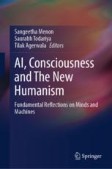Search
Search Results
-
The importance of expert knowledge in big data and machine learning
According to popular belief, big data and machine learning provide a wholly novel approach to science that has the potential to revolutionise...
-
Encultured knowing: knowledge transmission and varieties of cultural learning
Much recent empirical work in the developmental sciences has emphasized the importance of cultural knowledge transmission for the processes of human...
-
Effectiveness of research ethics and integrity competence development – what do learning diaries tell us about learning?
Due to the variety of research ethics and integrity training formats it may be challenging to use a common instrument to monitor and evaluate the...

-
Human Learning and Machine Learning: Unfolding from Creativity Perspective
Learning goes beyond knowledge acquisition. It is about using and refining knowledge to solve problems and enhance abilities to deliver value. It has...
-
On the gradability of knowledge how, and its relationship to motor representations and ability
In this paper I defend the traditional anti-intellectualist claim that a form of knowing how to Φ (e.g., knowing how to play the guitar) exists that...
-
Interpersonal independence of knowledge and belief
We show that knowledge satisfies interpersonal independence , meaning that a non-trivial sentence describing one agent’s knowledge cannot be...
-
Knowledge and acceptance
In a recent paper, Jie Gao ( Synthese 194:1901–17,
2017 ) has argued that there are acceptance-based counterexamples to the knowledge norm for... -
Knowledge without dogmatism
Rachel Fraser, Gilbert Harman, Saul Kripke, and Maria Lasonen-Aarnio have offered arguments for paradoxical implications of knowledge. The arguments...
-
Inductive knowledge under dominance
Inductive reasoning aims at constructing rules and models of general applicability from a restricted set of observations. Induction is a keystone in...

-
Curiosity and Scientific Knowledge in Opposition to Religious Knowledge
This chapter addresses the contrast between the way curiosity is regarded in scientific disciplines and the way it has been regarded in the Christian...
-
Development and validation of a tool to assess researchers’ knowledge of human subjects’ rights and their attitudes toward research ethics education in Saudi Arabia
BackgroundResearchers must adhere to ethical and scientific standards in their research involving human subjects; therefore, their knowledge of human...

-
Track Thyself? The Value and Ethics of Self-knowledge Through Technology
Novel technological devices, applications, and algorithms can provide us with a vast amount of personal information about ourselves. Given that we...
-
Legal proof: why knowledge matters and knowing does not
I discuss the knowledge account of legal proof in Moss (
2023 ) and develop an alternative. The unifying thread throughout this article are reflections... -
Social learning in models and minds
After more than a century in which social learning was blackboxed by evolutionary biologists, psychologists and economists, there is now a thriving...
-
Early Conceptual Knowledge About Food
Recent research suggests that preschool (three- to six-years-old) children’s food cognition involves much more than the nutritional information...

-
Global service-learning and business education: the case of Azerbaijan
This study investigates the development of service-learning models for business school students in Azerbaijan. Drawing on the United Nations...
-
Knowledge Control and the Spectacle
The intellectual property system has become universal, imposing homogenisation pressure on knowledge production, subordinated to capitalist...
-
Interaction, interpretation and representation: the construction and dissemination of chemical knowledge from a Peircean semiotics perspective
This paper proposes a theoretical approach to discuss the relations among reality, chemists’ interactions with it, and the resulting interpretation...

-
Learning from Failures of Co-owned Firms: Common Ownership and Information Disclosure Fraud
This study focuses on learning effects between firms connected by common ownership. We explore the learning effects in a certain setting that how...
-
The Crisis of Romantic Knowledge: The Role of Information and Ignorance in Times of Romantic Abundance
Most crises of knowledge stem from lack of information. The current crisis of romantic knowledge stems from the opposite reason: too much...
